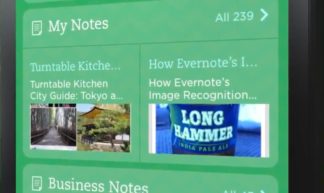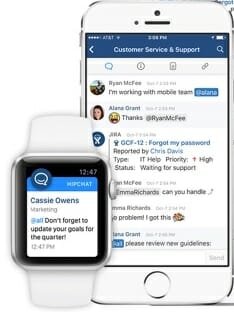Running a small business is a massive undertaking and it can be overwhelming. However, there are numerous mobile apps out there that can make your tasks a lot easier and more timely. These apps will help you get organized, communicate better and stay on top of your staff, your customers, your money – and your life.
Document Clutter Management
 Evernote is one of the best note-taking apps that we have seen. The app works seamlessly as you move from your mobile device to your desktop. Evernote serves as a great space to organize text content while being able to share, collaborate and view across all devices immediately because it syncs automatically. There’s a free version of Evernote with limited storage and sharing, but even the premium version, with 10 GB of uploads a month, costs just $69.99 a year. Also free: Evernote Scannable for iOS—scans and organizes business cards, receipts and contracts.
Evernote is one of the best note-taking apps that we have seen. The app works seamlessly as you move from your mobile device to your desktop. Evernote serves as a great space to organize text content while being able to share, collaborate and view across all devices immediately because it syncs automatically. There’s a free version of Evernote with limited storage and sharing, but even the premium version, with 10 GB of uploads a month, costs just $69.99 a year. Also free: Evernote Scannable for iOS—scans and organizes business cards, receipts and contracts.
To-Do Lists
Nagging or nice, to-do lists belong on your mobile phone if you want to get them done. Lots of great choices here, and in free versions. The only caveat is to try them and see if you will actually stick to completing all those tasks you enter. All of these will send you reminders, let you share lists with others, and display across multiple devices:
Video Meetings
If you manage a scattered staff, mobile video conferencing beats conference calls for getting things done in meetings and building a sense of teamwork. With the free version of Room, you tap “Get a room” for a link, send it to up to three other people and they can instantly join your video meeting. Cisco WebEx Meetings, a big-company standard, offers a free version for small business for instant video meetings (and document sharing) with two other people. Other choices: Fuze and Join.Me.
IM has evolved; in fact, some organizations are ditching email for Slack and HipChat. Employees can hop in and out of conversations based on topics but more impressively, can import documents or other files to share or can connect back and forth with other apps such as Twitter, email or project management tools, all from their mobile devices.
Payments
The biggest impact of mobile apps on business is on payments, liberating service businesses, and even retailers, from all the equipment and hard-wiring of point of sale (POS) systems.
Square is a payment app that uses a small portable credit/debit card reader to that attaches to a mobile phone. This tool is perfect for businesses that do events, are on-the-go and sell at markets etc. Your business will be charged 2.75% of every swipe, dip or tap which will be docked from the purchase automatically and reflected in your bank account on the following day. It’s a great tool that can turn any situation into a sale. Square has serious competitors in credit card readers from PayPal, QuickBooks GoPayment and Pay Anywhere.
Customer Service and Social Media
With mobile devices always on and always with your customers, you can pretty much expect customer inquiries and complaints to come in at any time. The Zopim mobile app (from customer service software maker Zendesk), lets you respond from your phone in a live chat with visitors to your website. Facebook is pushing its Messenger app for business as the primary communications tool for customer communication on its platform—and pushing “bots” to respond automatically to questions (see Facebook’s Future: Your Customer Service Bot).
And since customer service and communication these days is so much about publishing and reacting to messages on social media, management tools like Hootsuite, SproutSocial and Buffer come in mobile versions so you’re always able to post and respond in real time.
Our clients use the Dex Media Mobile App to manage their online marketing campaigns. Find out more.






